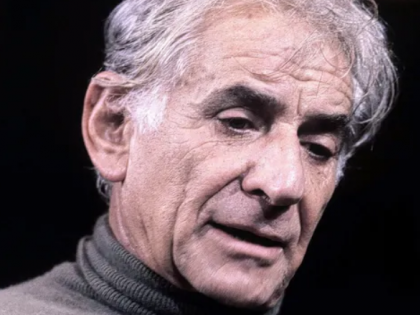Who Was Leonard Bernstein? All You Need To Know About Composer in ‘Maestro’
By Lokmat English Desk | Published: December 22, 2023 01:37 PM2023-12-22T13:37:21+5:302023-12-22T13:39:06+5:30
Streaming on Netflix, the film 'Maestro' delves into the captivating journey of the iconic musician Leonard Bernstein, portrayed by ...

Who Was Leonard Bernstein? All You Need To Know About Composer in ‘Maestro’
Streaming on Netflix, the film 'Maestro' delves into the captivating journey of the iconic musician Leonard Bernstein, portrayed by Bradley Cooper and directed by Cooper himself. Bernstein's life, marked by triumphs and challenges, has left an indelible mark on the history of Western classical music.
Early Years and Musical Genesis (1918-1940)
Born in Lawrence, Massachusetts, in August 1918 to Jewish parents who emigrated from Russia, Leonard Bernstein, affectionately known as Lenny, exhibited an early affinity for music. His exposure began with hymns at the synagogue and a mix of popular and classical tunes on the radio. At the age of 10, a pivotal moment occurred when Bernstein's aunt left a piano at his home, sparking his journey into piano lessons.
Bernstein's musical prowess led him to the Boston Latin School and later to Harvard, where he majored in music. A significant turning point came when he studied conducting with Dimitri Mitropoulos, describing the experience as being "in his blood." Mitropoulos encouraged Bernstein to study conducting at the Curtis Institute in Philadelphia, where he not only learned scores but delved into understanding the composer's intentions.
In 1940, at the age of 25, Bernstein joined Tanglewood, the summer music school initiated by Serge Koussevitzky. Remarkably, within days of joining, he substituted for the ailing Bruno Walter in a performance with the New York Philharmonic, catapulting him into the classical music spotlight.
Triumphant Career and Passionate Style (1943-1958)
After the success of a 1943 concert at Carnegie Hall, Bernstein ascended to the position of director of the New York City Symphony Orchestra. His brilliance resonated across Europe, and in 1953, he became the first American to perform at Milan's La Scala opera house. Notably, in 1956, Bernstein collaborated with jazz legend Louis Armstrong, showcasing his versatility.
In 1958, Bernstein made history as the first American-born conductor to lead the New York Philharmonic. His conducting style, marked by passion and animation, emphasized the orchestra sounding like him rather than conforming to a standard. His talks on the art of performance, broadcasted and published as records, contributed to a growing audience for classical music.
Personal Life and Relationships (1951-1978)
In 1951, Bernstein married Chilean-born actor Felicia Montealegre, with whom he had three children. Despite their closeness, Bernstein maintained relationships with both women and men throughout his life. Montealegre accepted this aspect of his life, evident in her letters. Bernstein briefly left Montealegre for music scholar Tom Cothran but returned when she developed lung cancer, caring for her until her death in 1978.
Progressive Politics and Activism (1950s-1989)
Bernstein, throughout his life, used his musical prowess to advocate for progressive causes. On Christmas morning in 1989, following the fall of the Berlin Wall, Bernstein conducted Beethoven's Symphony No. 9, changing the word "joy" to "freedom." The symbolic alteration reached over 100 million viewers worldwide. That evening, Bernstein, with a hammer borrowed from a young boy, made his mark on the western side of the Berlin Wall.
A staunch activist, Bernstein protested against the Vietnam War and championed civil rights. His involvement in left-wing causes drew the attention of the FBI, resulting in the agency monitoring his activities for years.
Final Concert, Health Struggles, and Legacy (1990)
In his 50s, Bernstein, a heavy smoker, developed emphysema. His last concert at Tanglewood on August 19, 1990, became a poignant moment. Despite a prolonged coughing fit while conducting Beethoven's Seventh, he persevered and concluded the piece. Five days later, Bernstein announced his retirement and passed away.
Leonard Bernstein's final resting place is alongside his wife in Brooklyn, a copy of Mahler's fifth symphony opened to the page of the fourth movement, placed across his heart. His legacy endures not only in the compositions and performances that shaped classical music but also in his unwavering commitment to using music as a force for positive change. 'Maestro' on Netflix and the documentaries produced by Martin Scorsese and Steven Spielberg serve as poignant tributes to the maestro's enduring impact on the world of music and beyond.
Open in app